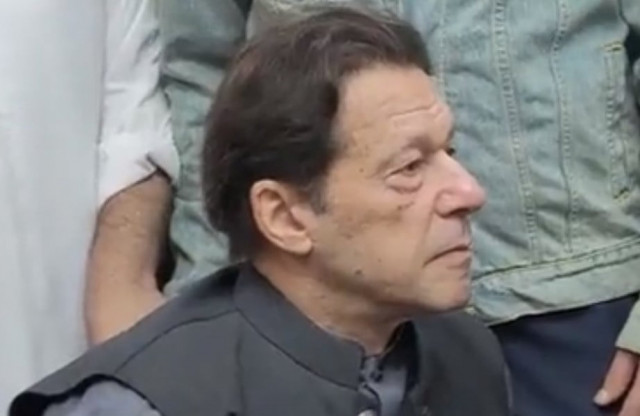Imran challenges ECP’s jail trial move
Request LHC to set aside polls oversight authority’s November 30 order

Former prime minister Imran Khan has approached the Lahore High Court (LHC) against the Election Commission of Pakistan’s (ECP) decision to hold his trial in a contempt case inside Rawalpindi’s Adiala Jail. The PTI founder—who has been in prison since August 5, 2023—has requested the court to set aside the ECP’s impugned order of November 30, which was unveiled on December 6, 2023.
He has also prayed to the court to declare “this secret and closed nature jail trial” as a sheer violation of his fundamental rights; direct the ECP to conduct the trial in open like normal courts. The ECP in August 2022 started contempt proceedings against PTI former chairman Imran, and former PTI leaders, Asad Umar and Fawad Chaudhry, for allegedly using "intemperate" language against the chief election commissioner (CEC) and the polls oversight authority.
Read Imran challenges ECP’s disqualification ruling in LHC
At the last hearing of the case, an ECP member had told Imran’s counsel that the Ministry for Interior had submitted a report that said that the former PM could not be presented before the ECP bench in view of security concerns, proposing that the ECP might send a team to jail to indict him.
Imran’s lawyer, Shoaib Shaheen, had expressed concern over the proposal, stating that the prison trial of a popular leader would send the wrong message to the world. In his petition, filed through Barrister Sameer Khosa, Imran Khan has named the federation, the CEC, the Ministry of Interior and Adiala Jail superintendent as respondents.
The PTI former chief contends that the ECP order incorrectly holds that the CEC has jurisdiction to order a trial “in secret and in jail”. He states that while deciding to hold his trial inside jail, the CEC has relied on a report furnished by the Adiala Jail superintendent.
Read ECP to hold contempt proceedings against Imran, Fawad at Adiala jail
The report, he notes, argues that since the Election Act 2017 does not specify that place of sitting or trial for contempt proceedings and because the federal government has already approved certain trials to be held in jail, therefore, the CEC has the authority to order a trial in jail.
Taking exception to this argument, he states that this is a case of an administrative or executive agency assuming a power for itself that is neither explicitly mentioned in the Constitution, nor allowed for by the authorizing legislation.
“Instead, [the] respondent CEC has inferred that [he] has the power to decide the location of the trial because respondent superintendent Adiala Jail tells [him] so.
“Silence cannot be presumed as allowing respondent CEC and Adiala Jail [superintendent] the authority to give whatever meaning to the Constitution and the Election Act as they deem fit.” The Constitution, the petitioner says, has the legal framework and is not a “tabula rasa” upon which the CEC and the superintendent jail can write whatever they want to.
Read ECP may hold Imran’s contempt trial in jail
“The scheme of the Constitution has been meticulously crafted so as to ensure that the fundamental rights of the citizens are protected against excessive interference.” The petition says the prison trial of the petitioner in another case is not a proof of the legality or acceptability of prison trials.
“In fact, it shows that respondent CEC and superintendent jail have already determined to deny the petitioner his fundamental rights and are using the cover of other proceedings to do the same.” He says the CEC has failed to appreciate that unless a specific power is granted under a statute authorizing him to conduct proceedings in jail, there is no inherent power vested in his office to conduct proceedings in this manner.
“Given that respondent superintendent jail’s report states that the Code of Criminal Procedure, 1898 does not apply to the proceedings, there is no authorization in either the Elections Act 2017 for the Contempt of Court Ordinance 2003 to conduct proceedings in jail. “Thus, the impugned order, in purporting to exercise a power that ECP does not have, is patently without jurisdiction,” the petition adds.



















COMMENTS
Comments are moderated and generally will be posted if they are on-topic and not abusive.
For more information, please see our Comments FAQ